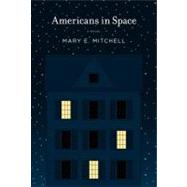
Note: Supplemental materials are not guaranteed with Rental or Used book purchases.
Purchase Benefits
Looking to rent a book? Rent Americans in Space [ISBN: 9780312372453] for the semester, quarter, and short term or search our site for other textbooks by Mitchell, Mary E.. Renting a textbook can save you up to 90% from the cost of buying.
Mitchell (Starting Out Sideways, 2007) arrestingly depicts a family consumed by grief.
Two years after the sudden death of her husband from an undiagnosed heart condition, Kate Cavanaugh’s family is virtually unrecognizable. Her daughter, Charlotte, has morphed into a sullen, tattooed teenager. Her four-year-old son Hunter, the book’s most affecting and lovable character, quietly toddles around clutching a ketchup bottle to his chest. The only person keeping the Cavanaughs functioning, it often seems, is their neighbor “Auntie Marge,” a wealthy tech geek with the body of a linebacker and a heart of gold. Kate’s professional success as a guidance counselor at Charlotte’s high school underscores her difficulties with her personal life. She effortlessly soothes the problems of the likable, charismatic misfits in the school’s “touchy feely” support group, but she is unable to have a conversation with her daughter that doesn’t devolve into yelling and slamming doors. Kate’s further breakdown after a school tragedy is painful to witness, but well handled by the author’s delicate description and organic dialogue. The myriad relationships—between mother and daughter, sister and brother, husband and wife, children and grandparents, friends and co-workers—are artfully rendered. The characters give the novel its shape; each acts as a window into seemingly inescapable grief and the strength required for revival. Mitchell keeps it honest by painting multidimensional people whose dark sides she’s willing to expose. Readers will be surprised at how quickly they are sucked into the Cavanaughs’ grief and how much they root for this small clan. The title alludes to the isolation and ungrounding of Kate, Charlotte and Hunter after a quarter of their family is unfairly taken away. Mitchell lets her characters drift further apart, their individual trials breaking our hearts until, mercifully, she brings them back down to earth.
Get out the tissues, but plan on reading this impressive, stirring novel straight through.
--Kirkus Reviews
The New copy of this book will include any supplemental materials advertised. Please check the title of the book to determine if it should include any access cards, study guides, lab manuals, CDs, etc.
The Used, Rental and eBook copies of this book are not guaranteed to include any supplemental materials. Typically, only the book itself is included. This is true even if the title states it includes any access cards, study guides, lab manuals, CDs, etc.